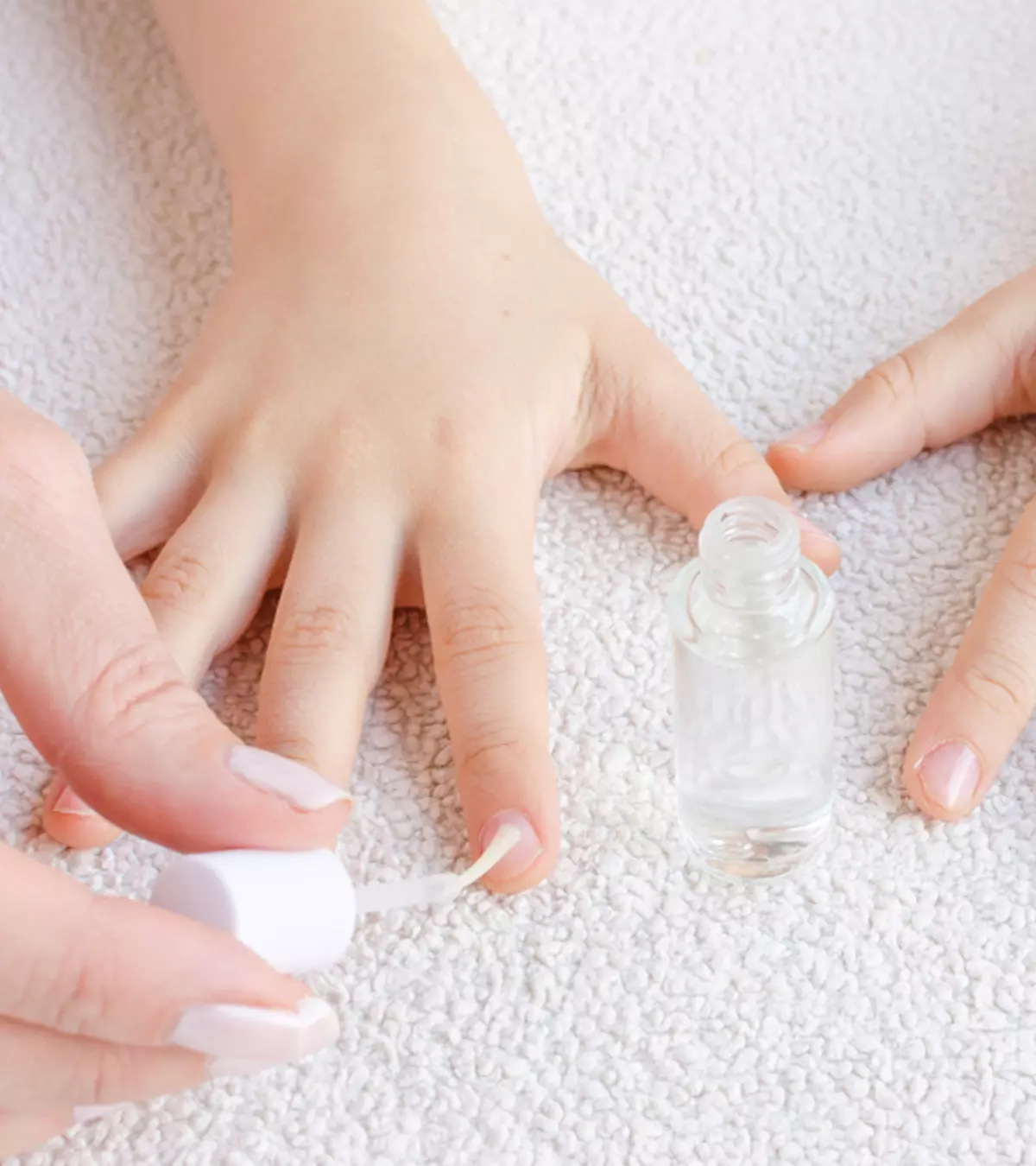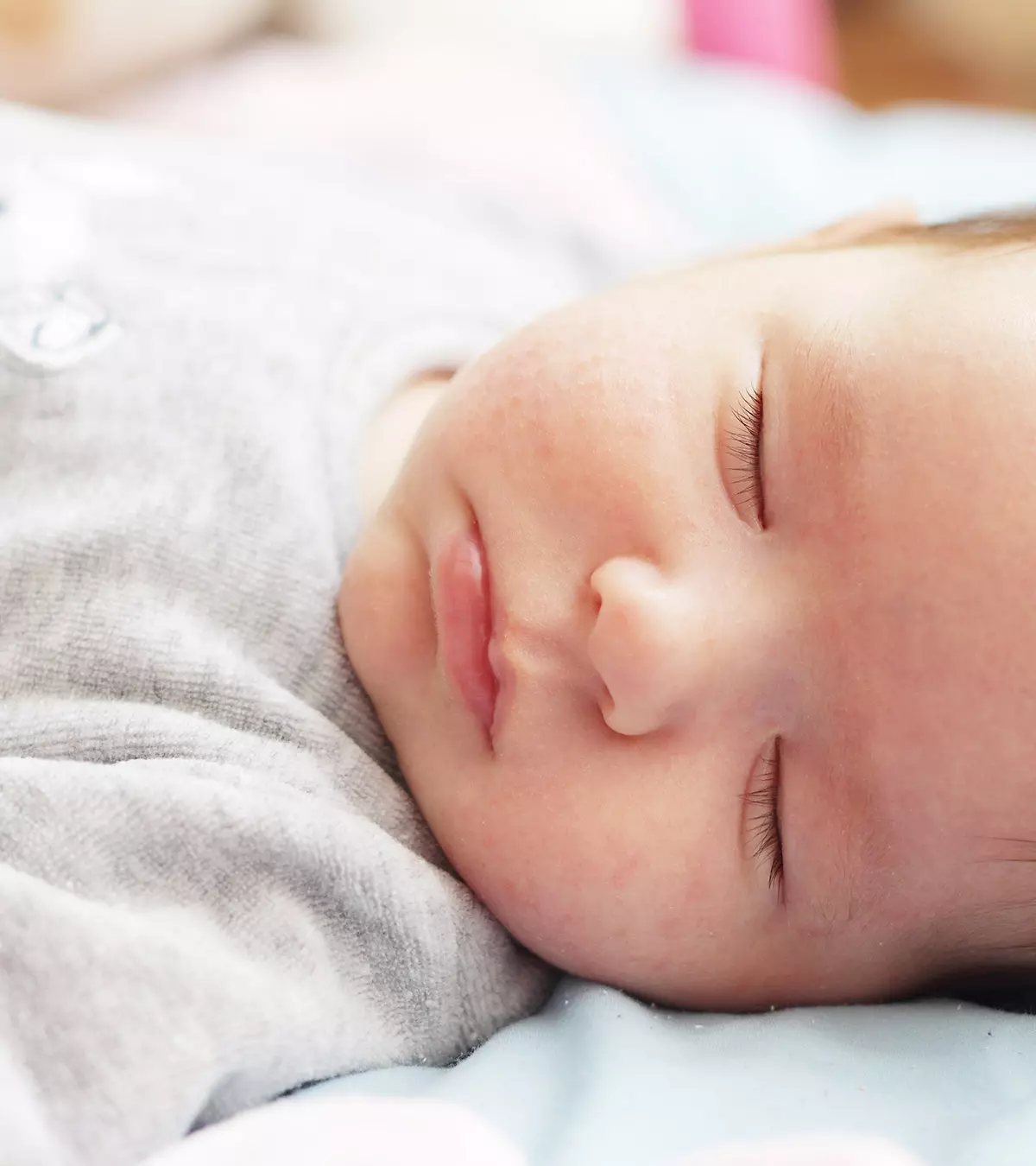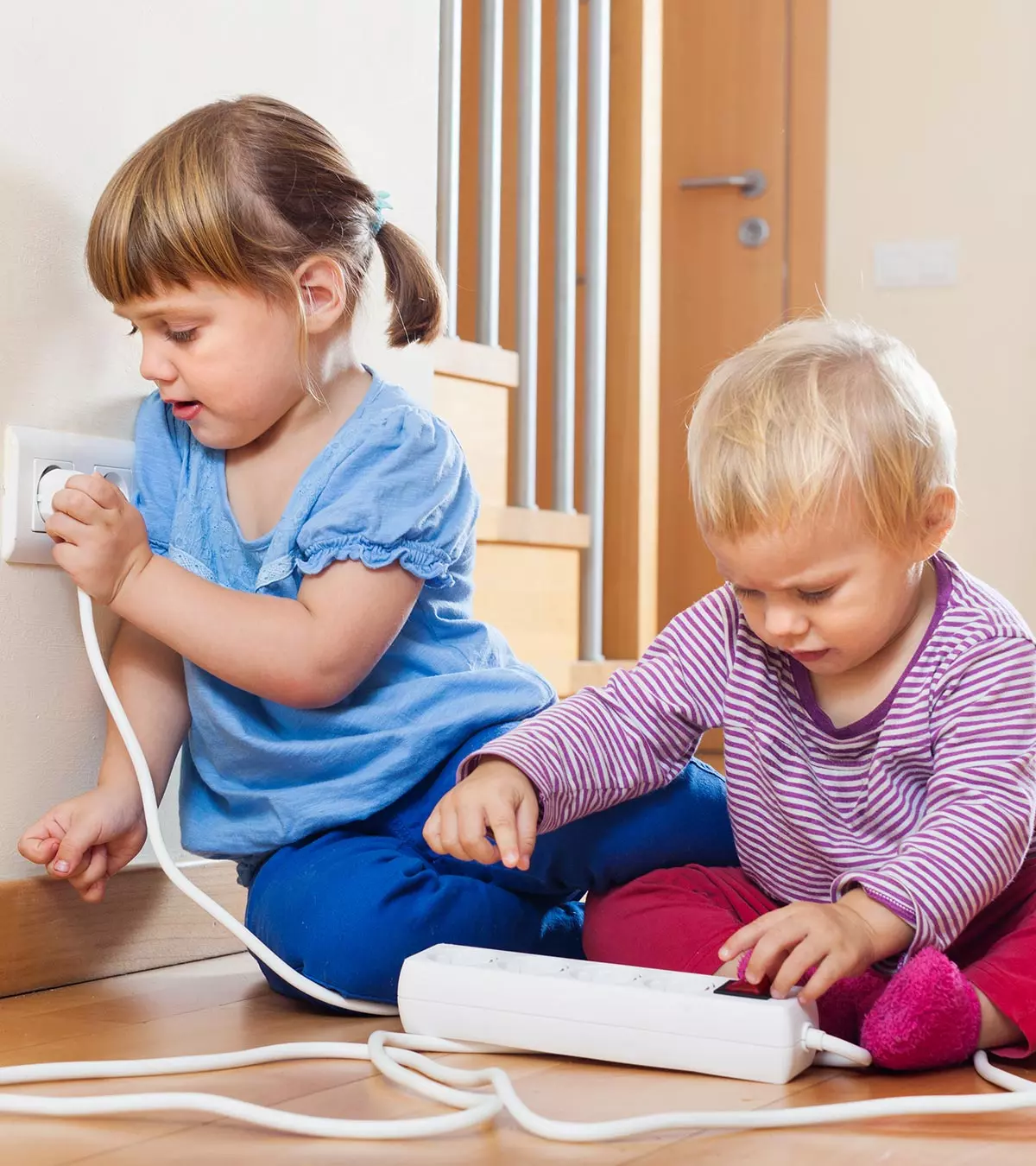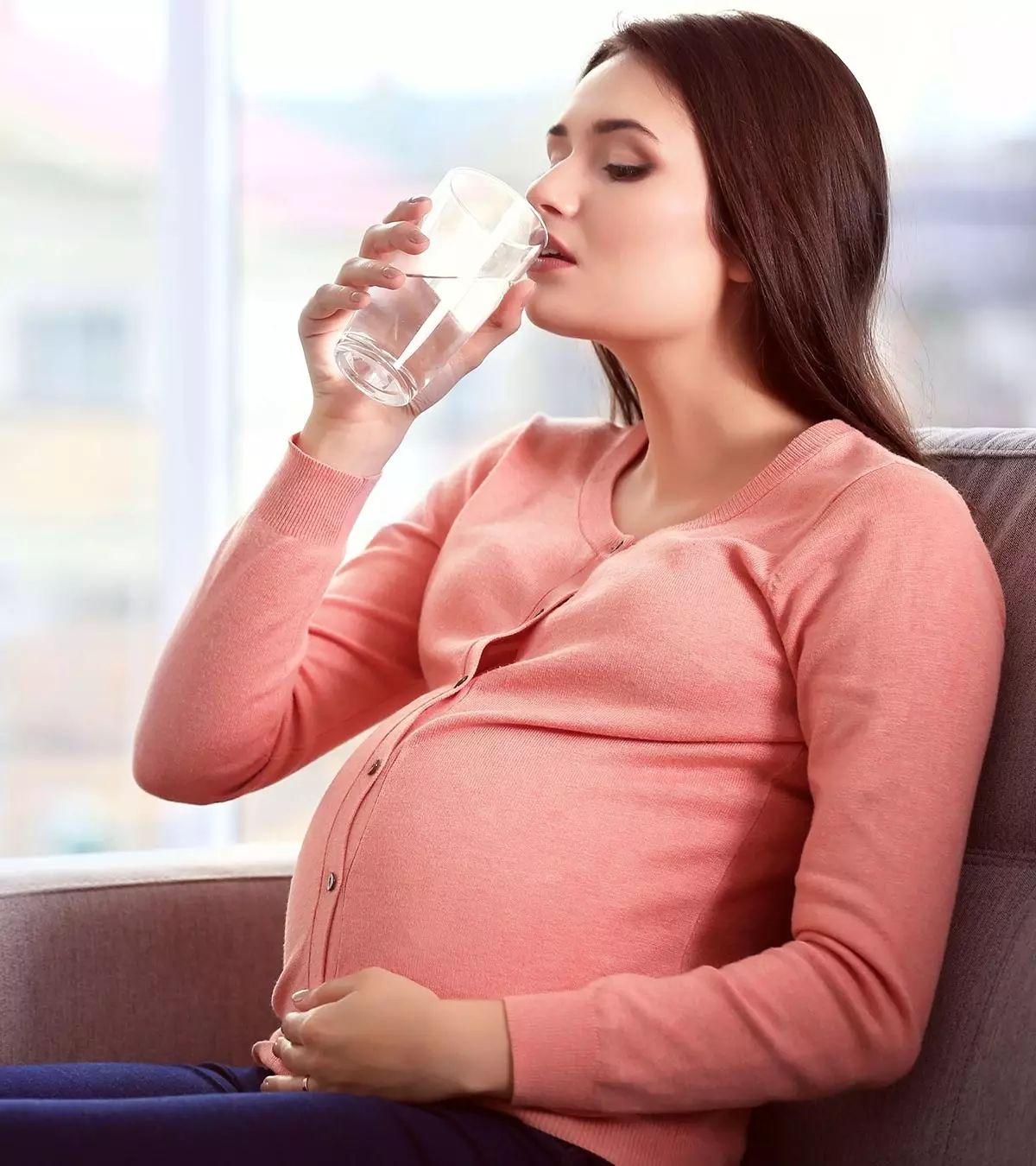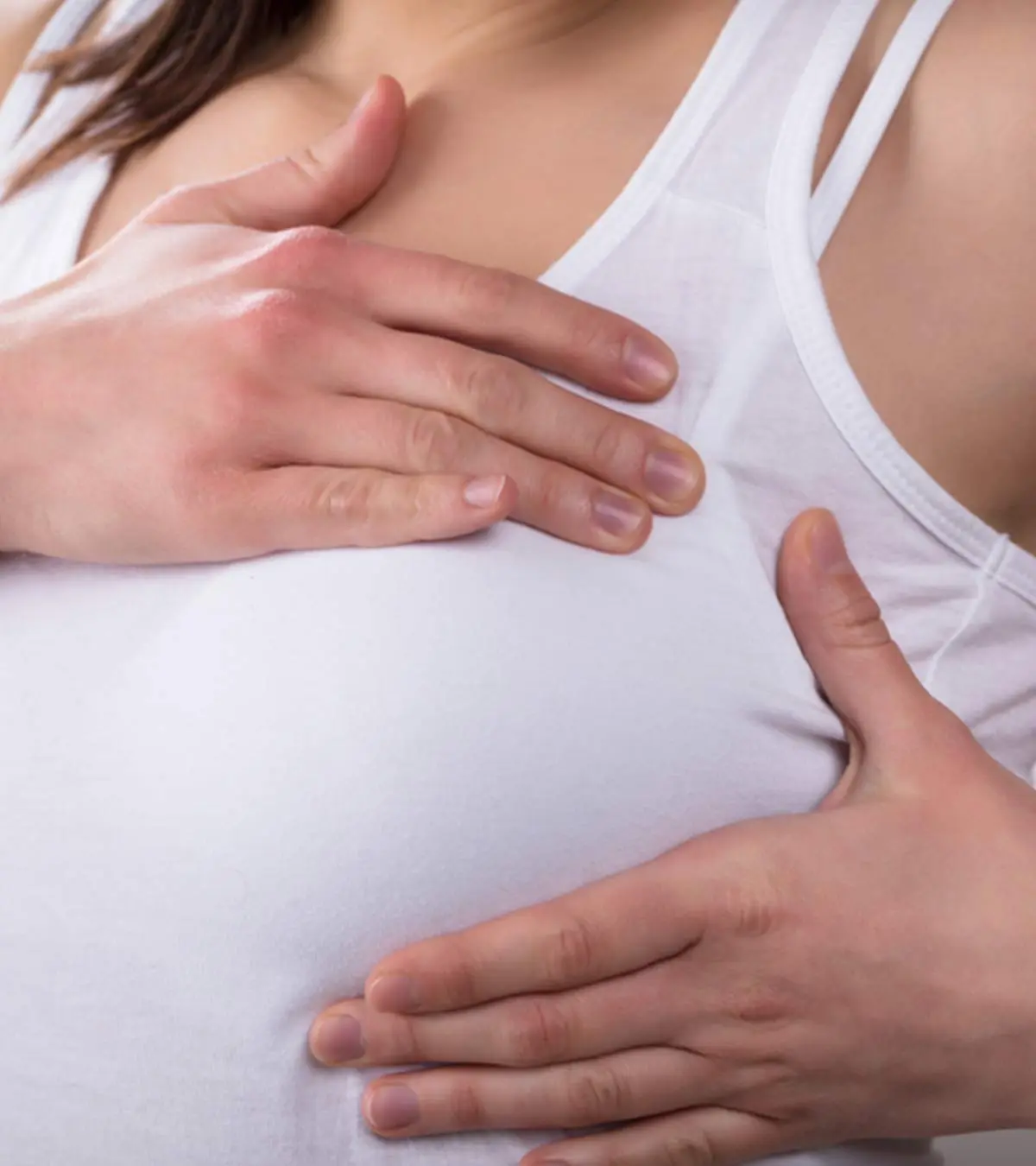
Image: Shutterstock
Some women may experience itchy breasts during pregnancy. This could either result from hormonal fluctuations or sensitivity in the skin, both of which are common in pregnant women. Although the condition is temporary, the symptoms may sometimes persist for longer periods. Under such circumstances, you need to consult your healthcare provider. Read on to learn about itchiness in breasts while pregnant, including measures to deal with it.
Key Pointers
- Itchy breasts are a common symptom during pregnancy, caused by hormonal changes.
- Pregnant women should avoid wearing tight clothes and choose breathable fabrics to prevent skin friction.
- Applying lotion or taking a cool shower can alleviate the itchiness.
- It is highly recommended to consult a doctor if the symptoms persist.
Are Itchy Nipples An Early Sign Of Pregnancy?
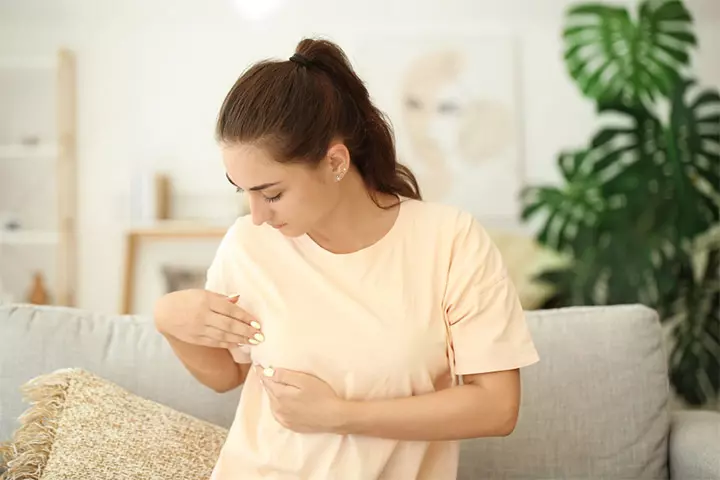
Breast changes might begin as early as one to two weeks post-conception (1). The breasts may become tender, sore, enlarged, or tingle, while the nipples become tender, cracked, or swollen (2). However, this cannot be a standalone symptom of pregnancy. Only when you see this in association with other prominent pregnancy symptoms can you confirm your pregnancy.
When Are Pregnant Women Likely To Have Itchy Nipples?
You may experience itchy nipples as early as one to two weeks after conception. Itchy nipples due to stretch marks (striae gravidarum) are likely to develop after the 24th week of gestation (3).
Itchy breasts due to eczemaiA skin condition that causes itchy, red, and scaly patches on the skin due to various factors such as allergies, genetics, or stress (one of the common dermatoses during pregnancy) usually develop within the first two trimesters (4), whereas itchy breasts or nipples from PUPPPiA skin condition causing intense itchy, red rashes in the belly area during pregnancy (pruritic urticarial papules and plaques) might occur in the third trimester (5).
 Experts say
Experts sayCauses Of Itchy Nipples During Pregnancy
Your breasts and nipples may itch and irritate due to the different physiological changes that happen in pregnancy. Some of those changes are listed below:
- Hormonal changes: Most skin changes during pregnancy are due to the surge in levels of progesteroneiA female hormone responsible for menstruation and pregnancy and estrogeniA female sex hormone responsible for the development of female sexual characteristics , besides other hormones affected by pregnancy (6). This is the reason you may experience itchiness along with the darkening of the skin on and around the areola of nipples.
Dr. Alan Lindemann, MD, an obstetrician, maternal mortality expert, and former clinical associate professor at the University of North Dakota, says, “Itching breasts can be hormonal because there’s a lot of activity in breasts during pregnancy. There is a proliferation of breast tissue which causes the breasts to enlarge. This may cause the skin to stretch and itch. You might also expect stretch marks on your breasts during pregnancy. Stretch marks itch.”
 Quick fact
Quick fact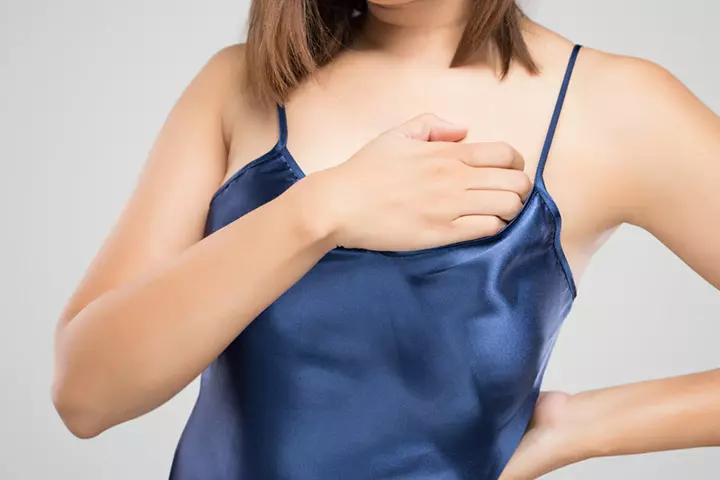
- Skin striae: According to the National Institutes of Health, skin striae or skin gravidarum, commonly known as stretch marks, are experienced by about 43% to 88% of all pregnant women (8). As the baby grows, your skin stretches and the breasts become dry and uncomfortable, which can cause itching (9).
- PUPPP: It may affect about every 1 in 160 pregnancies. You might experience itching at the tiny hives or bumps that develop on the skin. They are likely to appear on the abdomen and later spread to the extremities, including breasts, buttocks, and thighs. Experts from the American College of Obstetricians and Gynecologists (ACOG) state that the exact cause of these rashes is unknown, but they typically resolve after delivery (10). The chances of getting a PUPPP may be more if you are white, carrying a male baby, are pregnant for the first time, or are carrying twins or triplets (11).
- Atopic eruption during pregnancy (AEP):Those with a history of atopy (atopic dermatitis) are likely to develop red, scaly, and itchy patches on their breasts, neck, and other dry skin areas. This usually leads to the eruption of red spots and raised skin bumps, along with itching (12).
- Intertrigo in pregnancy: It is not a pregnancy-specific condition. It is a term used to describe rashes that may occur under the breast and may burn and itch. It happens when skin folds rub together, creating a warm, moist environment that favors the overgrowth of bacteria and yeast. However, it is not contagious (13).
- Prurigo of pregnancy: It refers to tiny, itchy bumps that may appear anywhere on the skin. The rashes may resemble bug bites and are thought to be caused by the immune changes resulting from pregnancy. This condition is not associated with a particular trimester and usually starts with a few rashes that increase every day.
Yeast infections, cholestasis of pregnancy (a liver problem that causes severe itching of the hands and feet), Paget’s disease of the breast (rare breast cancer), and mastitis (breast tissue inflammation) could also cause itching of the breasts and nipples (14) (15).
 Quick fact
Quick factHow To Relieve Itchy Breasts/ Nipples During Pregnancy?
Unless they are due to an underlying medical condition, itchy breasts and nipples could be managed with a few home remedies. Follow these tips regularly to keep your skin supple and to get relief from itchy and dry skin during pregnancy.
- Use a lotion: You can apply a good moisturizing lotion to your breasts and nipples. Lotions containing cocoa butter, vitamin E oil, aloe vera, lanolin or petroleum jelly, and calamine lotion could help deal with itchy skin (16). Apply it generously to your breasts and nipples at least twice a day to keep the skin hydrated and soft. Do not use any lotions that contain fragrances or alcohol as they may make the skin drier. Take a patch test before trying any new cream.
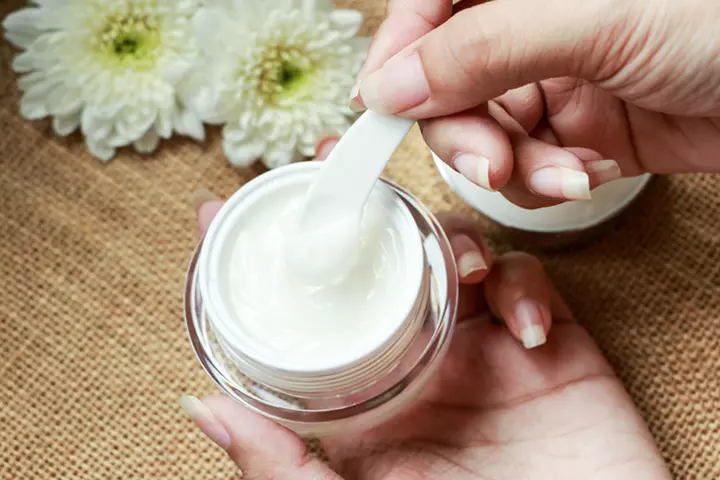
- Choose the right clothes: Wear loose and breathable cotton as they do not trap the sweat unlike synthetic clothes. Invest in a good maternity bra that may not cause skin irritation or itching.
“I believe that certain kinds of bras could cause breast itching. Skin is generally sensitive during pregnancy, so avoid artificial fabrics, particularly those made from petroleum. Instead, I would recommend getting a cotton bra to decrease the potential for itching,” Dr. Lindemann suggests.
- Avoid harsh soaps and perfumes: Use mild and fragrance-free soaps and avoid scented perfumes or lotions that might make itchy nipples worse. Also, use fragrance-free detergents for washing your clothes.
 Experts say
Experts say- Avoid hot showers or baths: These might dry out your skin and cause a rash. You may instead take a lukewarm or cool shower. Do not shower for more than five to ten minutes as excess time in water may also dry out your skin.
- Humidifier or a damp cloth rub: Place a humidifier in your bedroom as it could help prevent your skin from drying and may lessen the irritation. You can also use a damp cloth on the affected nipple to ease the irritation and allergies.
Dr. Tasha, a breast cancer surgeon, and medical educator, sheds light on common causes of itchy breasts, “If you have sensitive skin, you may be experiencing an allergy to something new that you have introduced, such as a change in shower gel, bath gel, laundry detergent, or even new clothes, undergarments, or bed linen. Do check it out and address it as necessary (i).” - Drink more water: You should ideally have six to eight ounces of water every day to avoid issues such as constipation and dehydration (17). Hydration could also make your skin healthy by reducing its dryness, thereby itchiness.

If the above measures do not give any relief from itchy nipples, your doctor may suggest some topical medication. In some cases, itchy nipples and breasts may also be signs of chafing or yeast infections. It is, therefore, advisable to seek your doctor’s advice when home measures do not work.
Frequently Asked Questions
1. What do itchy breasts mean during pregnancy?
Itchy breasts in pregnancy can be due to physiological reasons in most women. During pregnancy, hormonal changes, increased blood supply, and breast expansion can result in itchy nipples. Pregnant women can also experience nipple soreness, tingling, and breast heaviness. These symptoms are rarely caused by serious conditions in pregnancy (16).
2. How to treat itchy nipples during pregnancy?
You may use lotions without chemicals such as cocoa butter, lanolin, or vitamin E to hydrate the nipples. Liquid petroleum jelly may help to prevent dryness and itching after showers. Using mild fragrant detergents and soaps helps avoid harsh chemicals that can trigger nipple itching. Staying hydrated and using a gentle skin moisturizer regularly can help prevent dryness. Some pregnant women feel relief with maternity bras since it provides better air circulation and support.
3. Can I be pregnant without having itchy nipples?
Some women report that they have not experienced pregnancy symptoms in the first few weeks. So you may be pregnant without itchy nipples. However, you may look for other pregnancy symptoms such as missed periods, nausea, fatigue, and breast tenderness (18).
4. Are over-the-counter anti-itch creams safe to use during pregnancy?
If you are considering using creams for stretch marks, there’s no proof they can help with the itching (21). However, if the itching is caused by a more serious issue, your doctor might suggest some over-the-counter creams based on the cause. Always check with your doctor before using any medicated products during pregnancy.
The itchy breast may be difficult to diagnose as it resembles other skin or breast-related conditions. Though the underlying cause is not usually serious, it is certainly annoying to have an itchy breast while pregnant. You may try alleviating the symptoms with home care tips and remedies. However, if the symptoms do not resolve, it is best to contact your doctor to have a detailed investigation and initiate appropriate treatment.
Infographic: How To Relieve Itchy Breasts/Nipples During Pregnancy?
Pregnancy brings about many changes in a woman’s body, itchy breasts/nipples being a common one. While mild itchiness is normal, severe itchiness can cause irritation and pain and even pain. This infographic presents simple yet effective ways to manage the condition. Read on!
Some thing wrong with infographic shortcode. please verify shortcode syntaxIllustration: Ways To Relieve Itchy Breasts Nipples During Pregnancy
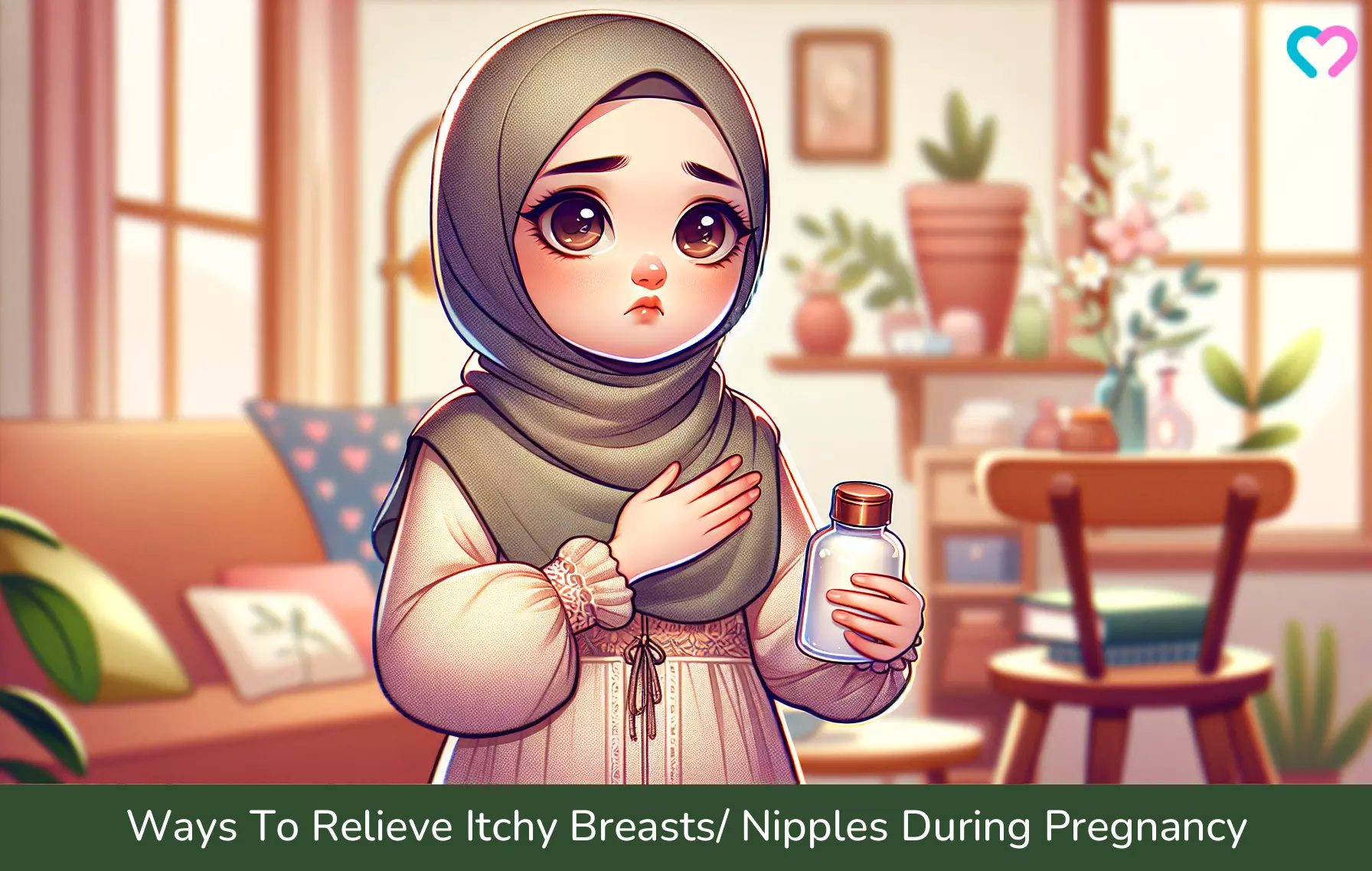
Image: Dall·E/MomJunction Design Team
Personal Experience: Source
MomJunction articles include first-hand experiences to provide you with better insights through real-life narratives. Here are the sources of personal accounts referenced in this article.
i. Causes of Itchy Breasts – with Dr Tasha;https://www.youtube.com/watch?v=_5rAb_8HX0o
References
1. Breast changes during pregnancy; HSE.
2. My pregnancy Weeks 1 —20; UCLA Obstetrics and Gynecology
3. Hibah Osman et al.; Risk factors for the development of striae gravidarum; Am J Obstet Gynecol (2007)
4. Sophie Weatherhead et al.; Eczema in pregnancy; BMJ (2007)
5. Pruritic Urticarial Papules And Plaques Of Pregnancy; American Osteopathic College of Dermatology
6. Justyna Szczęch, Artur Wiatrowski, Lidia Hirnle, Adam Reich; Prevalence and Relevance of Pruritus in Pregnancy; Biomed Res Int. 2017
7. Breast Changes During Pregnancy; American Pregnancy Association
8. Amanda M. Oakley and Bhupendra C. Patel;Stretch Marks; National Library of Medicine
9. Stretch marks in pregnancy; NHS (2019)
10. Skin Conditions During Pregnancy; American College of Obstetricians and Gynecologists (2018)
11. PUPP rash; Cleveland Clinic (2018)
12. Atopic Eruption of Pregnancy; Australasian College of Dermatologists
13. Intertrigo(AEP); American Academy of Family Doctors(2013)
14. Cholestasis of Pregnancy; St. Louis Children’s Hospital
15. Cansu Karakas; Paget’s disease of the breast; J Carcinog (2011)
16. Caring for Yourself During Pregnancy and Beyond; UCSF Medical Center
17. How much water should I drink during pregnancy?; ACOG
18. Early Signs of Pregnancy; American Pregnancy Association
19. Nipple Pain, Itching & Rashes: Could It Be a Nipple Yeast Infection?; Cleveland Clinic
20. Betty Ann Countryman;Breast Care in Pregnancy; Journal of Obstetric, Gynecologic & Neonatal Nursing (1972)
21. Your complete guide to: A healthy pregnancy Labour and childbirth; The first weeks with your new baby; National Health Service
Community Experiences
Join the conversation and become a part of our nurturing community! Share your stories, experiences, and insights to connect with fellow parents.
Read full bio of Dr. Umera Zakiahmed Saiyed
- Dr. Alan Lindemann is an obstetrician and maternal mortality expert, who worked as a clinical associate professor at the University of ND. An alumnus of the University of ND and the University of Minnesota, he is a member of the American College of Obstetricians and Gynecologists and the American Medical Association.
 Dr. Alan Lindemann is an obstetrician and maternal mortality expert, who worked as a clinical associate professor at the University of ND. An alumnus of the University of ND and the University of Minnesota, he is a member of the American College of Obstetricians and Gynecologists and the American Medical Association.
Dr. Alan Lindemann is an obstetrician and maternal mortality expert, who worked as a clinical associate professor at the University of ND. An alumnus of the University of ND and the University of Minnesota, he is a member of the American College of Obstetricians and Gynecologists and the American Medical Association.
Read full bio of Rebecca Malachi
Read full bio of Swati Patwal
Read full bio of Dr. Joyani Das







